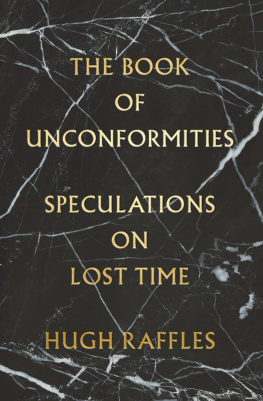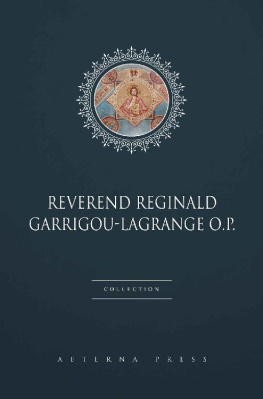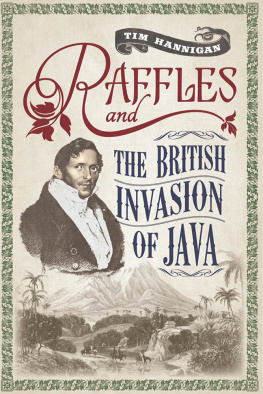This edition is published by BORODINO BOOKS www.pp-publishing.com
To join our mailing list for new titles or for issues with our books borodinobooks@gmail.com
Or on Facebook
Text originally published in 1926 under the same title.
Borodino Books 2017, all rights reserved. No part of this publication may be reproduced, stored in a retrieval system or transmitted by any means, electrical, mechanical or otherwise without the written permission of the copyright holder.
Publishers Note
Although in most cases we have retained the Authors original spelling and grammar to authentically reproduce the work of the Author and the original intent of such material, some additional notes and clarifications have been added for the modern readers benefit.
We have also made every effort to include all maps and illustrations of the original edition the limitations of formatting do not allow of including larger maps, we will upload as many of these maps as possible.
RAFFLES
1781-1826
BY
R. COUPLAND
Fellow of All Souls College
Beit Professor of Colonial History in the
University of Oxford
Let it still be the boast of Britain to write her name in characters of light.
I
ON October 19, 1781, the day on which Cornwallis, hemmed in by land and sea, surrendered to Washington at York Town, the first British Empire died. On April 12, 1782, when Rodney caught and crippled the French fleet among the Leeward Islands, the second British Empire, it may be said, was born. For by the Battle of the Saints the British command of the sea was recovered, not to be lost again; and it was this command of the sea that made possible, if not almost certain, the building up of a new British world-society on the ruins of the old.
A few months before the first of these decisive events, on July 6, 1781, there was born, on board the merchant-ship Ann off Port Morant in Jamaica, a boy who in after life was to take a memorable part in the work of imperial reconstruction. The place of his birth was appropriate; for Thomas Stamford Raffles career was to be associated with the expansion of British trade in the tropics. And, born afloat and under a far-ranging flag, he was to achieve his lifes work not, like most men, within a more or less narrow radius of his birthplace, but among seas and islands on the opposite side of the globenot in the West Indies, but in the East Indies.
Raffles father was the Master of the Ann, engaged in the trade between London and Jamaica. Of his family little is known except that it had been connected for some generations in the past with Beverley in Yorkshire, where one of his ancestors, like one of Wilberforces, was once mayor. Nothing at all is known of his mothers family, except the name of Lyde. And over the sons early years hangs as dark a veil. It is not till he is about twelve that at last it rises and discloses him at a boarding-school kept by a Dr. Anderson at Hammersmith. He is devoted to animals, it appears, and to gardening; but of his education, of his life at the school, there is nothing at all on record except that it was short. Captain Raffles, it seems, had not made a success of his profession. He was not merely a poor man, he was seriously in debt; and it was a sordid necessity that his only surviving son should be set to earn what money he could at the earliest possible age. Before he was quite fourteen, therefore, an extra-clerkship having been obtained for him in the office of the East India Company, Thomas Stamford said goodbye to Dr. Anderson and entered, as he put it in later days, the busy scenes of public life. I have never ceased to deplore, he once wrote, the necessity which withdrew me so early from school.
At an age, then, when happier contemporaries with great careers ahead of them had still some years to run at Eton and a spell at Oxford or Cambridge to follow, young Raffles entered India House and sat down at his desk. And there for five years he worked as few boys have ever worked, not only at his office duties, but, in every leisure moment he could snatch, to continue his education. Born with the gift of tongues, he applied himself to French and mastered it. He read widely in the English and French classics. He set himself, with a special and lasting zest, to acquire some scientific knowledge of the animal and vegetable world. And, all the while, the boy was harassed and cramped by the anxieties and exigencies of poverty at home. I shall never forget, he said long afterwards, the mortification I felt when the penury of my family once induced my mother to complain of my extravagance in burning a candle in my room. A rather depressing, a rather stunted life, very different from life at Eton; but after five years of it the picture brightens a little. Raffles private work before and after office-hours had not prevented him from satisfying his employers. His industry and capacity, indeed, had made such a deep impression at India House that in 1800 he obtained by merit a post on the regular establishment which would normally have been filled by patronage. It meant a substantial rise in salary, and it enabled him to earn extra pay by doing extra work. He was presently getting as much as 100 a year and contributing to the upkeep of his familybut at a cost. He had always been delicate; he was probably ill-nourished; and now for the first time, but not by any means for the last, he began to overstrain himself. Once there was a whisper of consumption. Neither then nor at any time, however, would Raffles surrender to his body. On the one recorded occasion on which he was positively ordered to leave his work and take a fortnights holiday, he set out on foot for the Welsh mountains, walked no less than thirty or forty miles a day, and returned to his desk in the best of health and spirits. And so for five more years he toiled onfive tremendous years while Europe shook beneath Napoleons tread, the years of Marengo and Hohenlinden, the armistice of Amiens, the camp at Boulogne, the prelude to Trafalgar and Austerlitz. What did Raffles think of the history that was being made around him? What were his opinions of the great men of the day? Did he worship Pitt, like most of those more favoured youths? Or was he inclined to defy majorities and to defend unpopular causes? Was Fox his leader? And what were his own ambitions? Did he aspire to play a part himself among the heroes of that epic age?
He certainly had ambitions. You always said, he wrote in 1811, at one of the great moments of his life, to an intimate friend of those early days, I was a strange, wild fellow, insatiable in ambition, though meek as a maiden. And one can hazard a guess as to whither his hopes were pointing. He had no need to look beyond the records of India House for precedents of young men, unendowed with family influence or wealth, rising rapidly to fame and fortune. What was to prevent him from treading the path that Clive had trod? He belonged, undoubtedly, to the species of Englishman that has always instinctively responded to the call of the East. For such men the very names of ancient Indian cities have a fascination of their own; and even the heavy atmosphere of India House, even the dull materials of his daily work, the business-correspondence, the bills of lading, the financial statements, may have been tinged for Raffles with romance. And there was a more substantial consideration that pointed to the East. Intensely devoted to his family, especially to his mother, bitterly exasperated by the unceasing fight with poverty, the big worries of debt, the little worries of scraping and stinting to make both ends meet from day to day, young Raffles must have longed above all else to make his fortune and to make it quickly. And where had fortunes been so quickly made as in India? The home-coming of the Nabobs had been one of the most portentous events in the social life of eighteenth-century England. Their great days, it is true, were over now. The one sinister phase of the British connexion with India had passed, and passed for ever. Englishmen could no longer amass fabulous wealth in a few years by illicit trading or less excusable means in Bengal. But the servants of the Company in India were now far better paid. Good, if by no means extravagant, salaries were now regarded not only as the obvious preventive of corruption but as a means of attracting ambitious young men to face the exile and the climate, so much deadlier then than now. And once his foot was on the official ladder, an Indian civil servant might climb high and, at a relatively early age and with perfect honesty, be able to build up what would seem quite a little fortune to a clerk who stayed at home.









